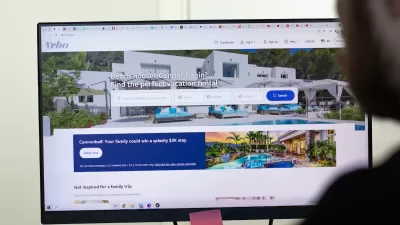The battles in New York and San Francisco have cities like Sacramento preparing for the growth of the home-sharing economy.

As Allen Young reports, the growing popularity of Airbnb in destination cities has "pitted landlords and other online home-sharing services against hotel unions, housing advocates and community groups." Anticipating a crackdown across the state, Airbnb reportedly approached Sacramento about reconsidering the legal terms surrounding short-term housing rentals. As in most cities, it is currently illegal in Sacramento to provide short-term lodging without a permit and without paying the same transient-occupancy taxes that conventional hotels pay. There are currently approximately 170 properties listed within the city, and more are expected as the sharing economy grows in popularity.
City officials first began considering writing rules around Airbnb use after the San Francisco-based company approached Sacramento to help legitimize its service," Young reports. The city's proposed cap on nightly stays was initially 30 days per year, relatively strict compared to cities like San Francisco and San Jose, with 90-day and 180-day caps, respectively. The purpose of a cap is to prevent landlords and homeowners from operating full-time hotels. Supporters of a cap argue that the proliferation of Airbnb rentals is reducing the availability of affordable housing in cities that are already struggling with soaring housing costs.
The proposal would likely include a transient-occupancy tax. Supporters argue that short-term renters should be required to pay the same taxes as other visitors who stay in hotels. According to their website, Airbnb collects local hotel taxes from renters in a limited number of cities that require it. In California, these include Oakland, San Francisco, Malibu, Palo Alto, San Diego, and San Jose. The local hotel tax in Sacramento is currently 12 percent.
FULL STORY: How Sacramento’s Airbnb proposal stacks up against other cities

Maui's Vacation Rental Debate Turns Ugly
Verbal attacks, misinformation campaigns and fistfights plague a high-stakes debate to convert thousands of vacation rentals into long-term housing.

Planetizen Federal Action Tracker
A weekly monitor of how Trump’s orders and actions are impacting planners and planning in America.

Chicago’s Ghost Rails
Just beneath the surface of the modern city lie the remnants of its expansive early 20th-century streetcar system.

Bend, Oregon Zoning Reforms Prioritize Small-Scale Housing
The city altered its zoning code to allow multi-family housing and eliminated parking mandates citywide.

Amtrak Cutting Jobs, Funding to High-Speed Rail
The agency plans to cut 10 percent of its workforce and has confirmed it will not fund new high-speed rail projects.

LA Denies Basic Services to Unhoused Residents
The city has repeatedly failed to respond to requests for trash pickup at encampment sites, and eliminated a program that provided mobile showers and toilets.
Urban Design for Planners 1: Software Tools
This six-course series explores essential urban design concepts using open source software and equips planners with the tools they need to participate fully in the urban design process.
Planning for Universal Design
Learn the tools for implementing Universal Design in planning regulations.
planning NEXT
Appalachian Highlands Housing Partners
Mpact (founded as Rail~Volution)
City of Camden Redevelopment Agency
City of Astoria
City of Portland
City of Laramie





























